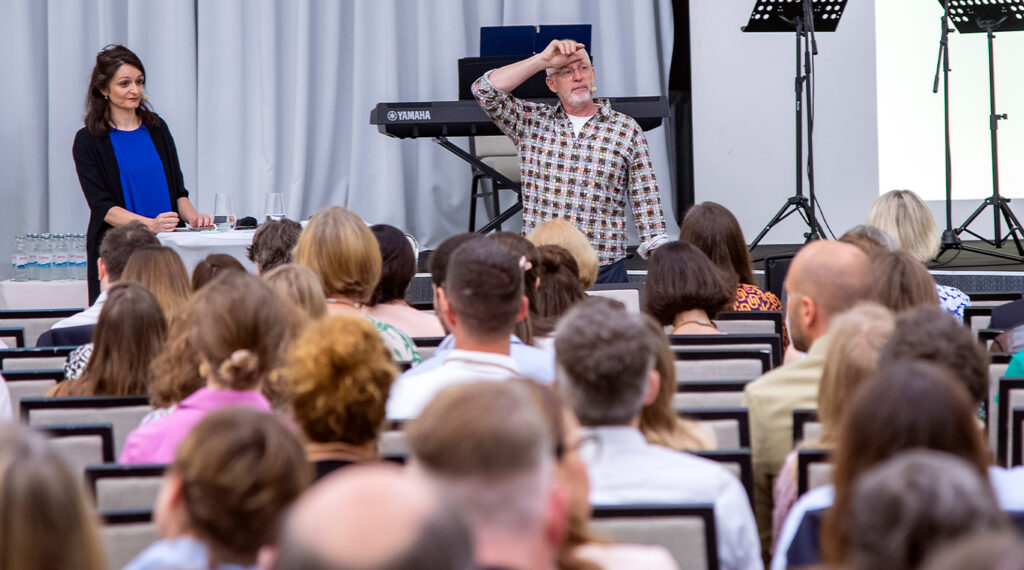Building a better Europe: Insights and reflections from the Philea Forum 2023 Opening Plenary

Which values, principles and ideals will philanthropy require when it comes to helping shape a better, brighter and more sustainable Europe? Against the backdrop of an increasingly complex and crisis-ridden world, almost 700 delegates at the 2023 Philea Forum held in May in Croatia delved into the role of philanthropy in steering Europe towards a future that addresses pressing challenges such as climate change, democracy, and equality.
The opening session set the stage for a dynamic and interactive conference experience, asserting the crucial role of philanthropy as a key broker and enabler in achieving positive social impact. Recognising the potential for collaboration between government, civil society, and the private sector, the session sought to gain insights into the significant opportunities and challenges associated with fulfilling this role, including the presentation of two perception surveys.
The first, part of the Bertelsmann Foundation’s eupinions project, represented the perspectives of 13,000 European citizens. The other survey was conducted among the Philea Forum participants (primarily foundations) during the registration process. The discrepancies between the views of citizens and foundations were remarkable.
- How satisfied are you with the way democracy works in the European Union?

As you can see, 57% of the EU citizens polled expressed satisfaction, indicating a certain degree of contentment. However, among the (arguably more) engaged and passionate participants of the Philea Forum, this satisfaction rate increased to 65%.
Interpretation:
Foundations have a vested interest in supporting democratic processes and institutions, as they rely on a stable and transparent environment to carry out their philanthropic endeavours effectively. Through their work, foundations actively engage with stakeholders, advocate for certain policies, and seek innovative solutions to address the underlying causes of societal issues. This heightened engagement and first-hand experience may contribute to their greater satisfaction with the functioning of democracy. In contrast, citizens’ perspectives on democracy are influenced by various factors such as the impact of policies on their lives, economic instability, social exclusion, and media narratives. The disparity in satisfaction levels underscores the need for continued dialogue, partnership, and a comprehensive approach to democracy that actively involves citizens and philanthropic actors alike.
2. Do you think the EU is doing enough to combat climate change?

Transitioning to the perceptions of the EU’s efforts in combatting climate change, the survey results present another notable disparity. Among the citizens, 39% believed that the EU is doing enough in this regard, whereas only 12% of the Forum participants shared the same sentiment.
Interpretation:
Foundations often have a long-term perspective and a commitment to driving transformative change. They may assess the EU’s efforts with a broader perspective, based on the alignment with international climate agreements, the level of ambition in setting emission reduction targets, the integration of sustainability principles into policies, and the support provided to sustainable innovation and adaptation initiatives.
It is important to note that while the survey results indicated a lower satisfaction level among Forum participants, it does not necessarily imply that the philanthropic sector itself is fully leveraging its potential in this field. There is a need for continuous self-reflection within the philanthropic sector to ensure its own practices align with the urgency of addressing the climate crisis. The dissatisfaction expressed by foundations with the EU’s efforts serves as a call to action for both philanthropy and the EU to collaborate and drive transformative change towards a sustainable future.
3. Imagine you could choose the three tasks the EU should focus on in the coming years. Please rank the three tasks in order of importance:

The perception surveys conducted among European citizens and participants at the Philea Forum 2023 revealed distinct priorities when it comes to the tasks the European Union should focus on in the coming years. According to the citizen poll, the task ranked as the most important by 49% of respondents was securing peace. Protecting citizens’ rights followed closely behind, with 41% considering it a top priority. Stopping climate change received a ranking of 35%, while managing migration was seen as a priority by 33% of citizens.
In contrast, the priorities expressed by Forum participants exhibited a distinctly different emphasis. The task that ranked highest, with a significant majority of 74%, was stopping climate change. Fighting inequality closely followed, with 65% of participants identifying it as a crucial focus. Protecting citizens’ rights received a ranking of 47%, while securing peace ranked at 36%.
Interpretation:
The contrasting perspectives between citizens and foundations regarding the EU’s future priorities prompted us to gather insights from Forum participants through an on-the-spot Mentimeter session. Two statements were presented for assessment, aiming to gauge their views on philanthropy’s role in achieving meaningful change in Europe.
4. How strongly do you agree with the following 2 statements:

The result for the first statement highlights the importance of striking a balance between incorporating public input and leveraging the expertise of foundations. It emphasises the value of public engagement in shaping philanthropic initiatives while also recognising the need for foundations to exercise their autonomy in addressing societal challenges.
The score for the second statement indicates a slightly stronger inclination towards strategic collaborations with the EU. It reflects the participants’ recognition of the potential benefits that can be derived from combining the resources, knowledge, and networks of philanthropy and the EU.
Interpretation:
It is important to note that foundations hold a deep commitment to philanthropic freedom and autonomy. While considering public priorities and establishing partnerships, foundations also value their ability to define their own focus areas and approaches. This aspect ensures that foundations can bring their unique expertise, experience, and innovation to address societal issues effectively. The nuanced perspectives expressed by participants underscore the delicate balance between responsiveness to public needs and the preservation of philanthropic freedom.
5. Focus areas around democracy

Attention then turned towards the activities philanthropy should undertake in the face of the challenges posed to democracies. The top areas that participants said philanthropy should focus on, as seen in the word cloud, were inequalities, education, youth, and misinformation. It is crucial to emphasise that these issues are interconnected and intersect with various dimensions. Democracies are intimately linked with climate change, gender equality, technology, youth engagement, and more. Understanding the intersectionality of these challenges is paramount in addressing them effectively and creating inclusive and resilient societies. By recognising the interplay between democracy and other critical areas such as climate justice, gender equity, and technological advancements, philanthropy can adopt a holistic approach to tackle these complex issues.
6. Foundations and climate change

The result for this question indicates that Forum participants recognise the urgency and magnitude of the climate crisis and acknowledge the responsibility of philanthropic organisations to play a proactive role in addressing it. It highlights the growing understanding within the philanthropic community that climate change is a paramount challenge requiring a comprehensive approach. It signifies a call for foundations to proactively adopt a climate lens in their programmes, operations, and investments, emphasising the importance of holistic action to tackle the climate crisis effectively.
While this sentiment is encouraging, it is essential that our actions align with our aspirations. At present, only 32 Philea members (out of 550 signatories based in Europe and 635 total signatories) have made the #PhilanthropyForClimate commitment, reflecting a smaller subset of foundations actively engaged in this transformative journey. As we reflect on the collective will expressed during the Forum, let us embrace this opportunity to reaffirm our commitment to sustainable practices and consider joining the ranks of those who have already signed the commitment. By doing so, we can collectively live up to the principles we espouse and lead by example in driving meaningful change in the face of the climate crisis.
7. Top operational priorities for philanthropy

Finally, participants were presented with the four tracks of the conference: strategy, philanthropic toolbox, collaboration, and policy and data. They were then asked to identify the top priorities for philanthropy in relation to these functional tracks, considering the challenges faced by Europe and the world:
- Trust-based giving, participatory approaches, and flexible funding emerged as the top choice. These priorities reflect a shift towards more inclusive and responsive philanthropic practices, emphasising the importance of building meaningful relationships and empowering communities.
- Applying intersectional lenses &shifting power; improving diversity, equity, and inclusion (DEI) across the board; and decolonising philanthropy were ranked as the second and third highest priorities. This demonstrates a growing recognition of the need to address systemic inequalities, power imbalances, and colonial legacies within the philanthropic sector.
- Increasing transparency and accountability of philanthropy ranked fourth in the participants’ priorities. This reflects a call for greater openness and responsibility within the sector, highlighting the need for transparency in decision-making processes, funding allocation, and impact assessment.
- Expanding the toolbox with impact investments, green and social investments, and loans beyond traditional grants was ranked fifth. This suggests an interest among the participants in exploring innovative financing mechanisms and expanding the range of tools available to philanthropy.
Interpretation:
These results indicate a growing appetite within the philanthropic community to innovate philanthropy from the inside out. The prioritisation of trust-based giving, participatory approaches, flexible funding, DEI, decolonisation, transparency and accountability, and expanding the toolbox reflects a collective desire for philanthropy to be more responsive, inclusive, and impactful.
Opportunity for change
As we reflect on the discussions and insights shared, it becomes clear that Europe stands at a crossroads, where crises present an opportunity for transformation. The philanthropic community, catalysed by its unwavering dedication to creating a better world, is poised to contribute significantly to shaping the Europe we aspire to. We embrace the challenges as a chance for philanthropy to lead the way, fostering innovation from within and driving positive social change. Together, we can forge a Europe that embraces sustainability, fosters collaboration, upholds our cherished values, and meets the needs of the present and future generations.
Authors


